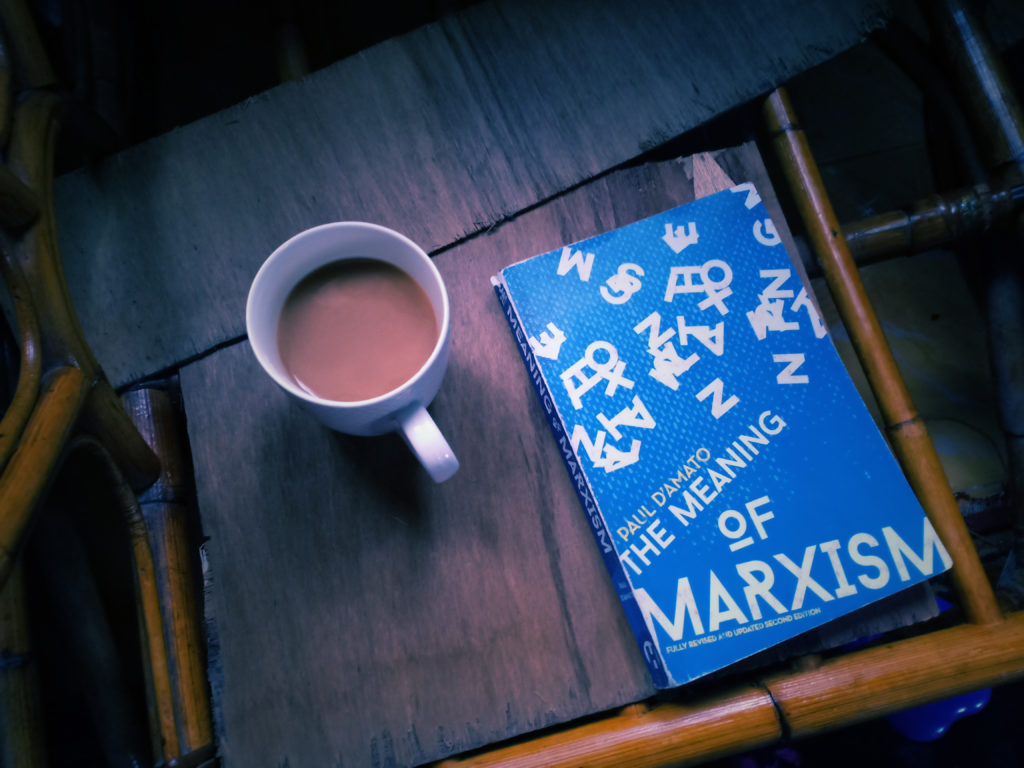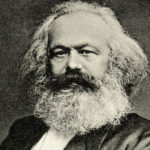
I was naive to think that I could understand Marx’s thinking by simply picking up the Communist Manifesto out of the blue and start reading it. Indeed, after this futile exercise several years ago, I understand and remember nothing except for the call for workers to unite, the last line of the manifesto.
Paul D’Amato did a brilliant job in this title explaining to layman reader the essence of Marxist thinking. It is a perfect place for any person to begin their journey to understand Marx’s elaborated thinking. I discover the book some time ago when I asked myself a question “If we gave everyone equal decent living wages to everyone, what will be the motivation for people to work, innovate and use their creativity?” – I landed on one of D’Amato writings on the net and discovered his book.
In his introduction, D’Amato exposes the need to have an alternative thinking to solve various social issues. The raison d’état for this need is the failing of capitalism – or the uncontrolled mess created by modern capitalism to be inherited to future generation. Capitalism created a huge gap between the rich and poor, often unbalance with unimaginable wealth and great misery stood side-by-side. He gave a stark example where per capita income of Sub-Saharan Africa stood at $490 whereas per capita subsidy for European cow is $913.
Marx was heavily influenced by Hegel’s philosophy, in fact he was considered a Young Hegelian during his early years. Initially he considered the workers as a suffering being, not a shaper of the world social condition. He still believed that change must come from philosophy, not crude material struggle. But after witnessing French workers commitment, workers strike in Britain, Germany, and France, Marx ceased to view workers as a secondary component to social change.
Marx materialist method insist on the importance of material change instead of only abstract value, ideologies, or theories. In the absence of enough food, equality as a value means slow death – an equality of suffering. Working class, now, viewed by Marx as active agent for their own liberation. When he wrote that “The philosophers have merely interpreted the world; the point, however, is to change it” he is not saying that abstract ideas are meaningless, it is meaningless if its stay on its own without any change on the physical and material ground, idea must transform material changes in society to be considered useful.
Through this thinking materialist rejected the idea that “people are poor because they are lazy, if they work harder, they can become wealthy”, which suggested human has unrestricted “free-will”. The fact is however, people were poor because of material condition such as factories close, wages are low, or people fell ill and can’t work. These all are material condition that can be change, its not a matter of abstract theory.
Because Marx was heavily influenced by Hegel, D’Amato discussed in adequate depth the concept of Hegelian Dialectics, which I enjoyed very much. He discussed how the death of old idea, and the birth of the new idea, is not separate and distinct, but one that negate from the other, the old idea create a condition for a new idea to emerge. Its like a plant which grew out from a seed, it grew into a new shape and form, yet both are the same plant. Marx applied this Hegelian Dialectics with materialism for social change. He viewed that the development of new society only made possible with the abundant material produced by capitalism. In other words, capitalism provided material condition to create a new socialist society. For example, the efficiency of food production makes it possible to eradicate hunger, the material condition exists, what’s needed is a new distribution system.
Other than Hegel, the book also discussed Thomas Hobbes in the chapter of Marxist view of history. Hobbes stated that a state, separate from the society is needed as an alternative to war. The state, in Hobbesian view, acted as referee that regulate social brawl, regulate conflict between different parties within society to maintain order by exerting its coercive force. But this view is flawed as it assumes that the state could be neutral, in reality the state also had interest in every issue. He explained how Marxist rejected this justification for power, stating that, through the writing of Engels, that the concept of state came at the later part of history and does not arise in the earlier time when the society exist in its egalitarian and classless form.
The discussion on economics, or Marxist economics was confined in one chapter in this book. It started with the flawed mainstream economic models that cannot predict economic crises, the mainstream economics dressed up themselves as “science” but it isn’t. He then put forward the labor theory of value (LTV) which was the foundation of Marx’s theory on capitalism. The theory supposed that value came from workers labor, and to create profit, capitalist cannot simply mark-up the price because these will cancel each other’s out in the commerce, they need to pay workers less than what their labor produce, the surplus become profit. This is the core of injustice towards workers, the book also discussed workers condition in company such as UPS and Amazon where workers literally managed and treated like “robots”.
In the capitalist system “over-production” means that a product was overproduced and cannot be profitably sell for profit. The supply and demand of overproduction does not correspond to human needs. That is why we can have “grain-glut” yet millions of people go hungry every year. India have 200 million malnourished people, yet India export 5,000,000 metric tonnes of rice in 1995.
Socialism according two D’Amato was possible and necessary for two main reason, one, the material abundance created by capitalism. This abundance makes it possible for everyone to live with dignity, without hunger, what socialist advocated is the distribution system base on human need not greed. Two, is the periodic crisis brought by capitalism, socialist advocate for a much more sustainable system, that is not based on short term profit, but by long term sustainable planning. The systemic change also possible, by the creation of a new set of people by capitalism, the proletariat.
Revolution is not a fancy vacation. Through out history it filled with blood, the question then is, can we reform the system without revolution? Or change the system gradually within the bound of constitution? D’Amato brought a wealth of historical example on the failure of the “reformist” and “constitutionalist”. One of them is the killing of Allende of Chile, he concluded that the ruling power will not give the key to power and privilege easily, it needs to be wrestled. To make sure that the power can be wrestled, the military must be on their side, and remain on their side once they have the power, so that restructuring can be carried out without falling back to the counter-revolution.
The history of Russian revolution also was discussed, albeit somehow briefly. D’Amato take the readers on how the Revolution was won, the tactics and strategies played out by Lenin and the Bolsheviks, and also how the revolution was lost, degraded into autocratic dictatorship of Stalinism. One of the strategies of Lenin was to never halt the work even though if the organization was thrown into illegality, the work must continue underground, according to the current condition, and resurface once condition allowed. The Russian Revolution failed because of the lack of material condition at that time, in order for socialism to succeed it needs material abundance, something that Russia was lacking. This disadvantage put a halt to the revolution from becoming, in Trotsky’s word “permanent revolution”, that is revolution works permanently until all her aim achieved. Permanent Revolution also means that it will not stop at national border, socialism cannot survive when confined in a nation as an island surrounded by an ocean of capitalism.
At the core of his argument, D’Amato insist on the definition of socialism, it not about nationalization, but what important is that workers control over production and distribution. What we have today is abundance of produce but disproportionately distributed, the system distributed product base one profit. Socialism on the other hand will base their distribution on human needs. This distribution system can only be achieved through internationalism, it cannot survive as island of socialism in the middle of capitalist ocean, as the failing of Soviet Union has shown.
Quoting the English writer William Morris on profit:
“It is profit which draws men into enormous unmanageable aggregations called towns, for instance; profit which crowds them up when they are there, into quarters without garden or open spaces; profit which won’t take the most ordinary precautions against wrapping a whole district in a cloud of sulfurous smoke; which turns beautiful river into filthy sewers; which condemns all but the rich to live in houses idiotically cramped and confined at best, and at the worst, in houses for whose wretchedness there is no name.”
On Zionism, D’Amato is very clear that the project is racist, but different from their South African counterpart, Zionism goes further than just oppressing native population, it seeks the removal of native Palestinian from their land to build exclusive Jewish state. D’Amato dispelled Zionist propaganda that Palestine was “a land without a people for a people without a land”. He also elaborated on the connection and contact of Zionist leaders with the Nazis, as they share the same goal, the Nazis want Europe without Jew, the Zionist want all Jew to fled Europe to resettled in their new Jewish nation, both shared the same goal of “separation of Jews from gentile”.
Finally, what does the future that socialism seek to build?
D’Amato answered this with the words from Eugene Debs “Production and distribution for all the people, collective ownership of industries and their management, elimination of rent, profit, and interest, the end of class rule, slavery, ignorance, poverty, cruelty, and crime”. Socialism seek to abolish class, and with that it rendered the existence of state as instrument of enforcement disappears. Whilst we may find that many of the solution proposed is hard to churn, many would agree on the failing and flaw of capitalism in structuring our modern society. We don’t have to be a Marxist or socialist, but, we all need to work together to re-created a more just and sustainable society.
Related Posts
Author of several books including Berfikir Tentang Pemikiran (2018), Lalang di lautan Ideologi (2022) and Dua Sayap Ilmu (2023). Fathi write from his home at Sungai Petani, Kedah. He like to read, write and sleep.





